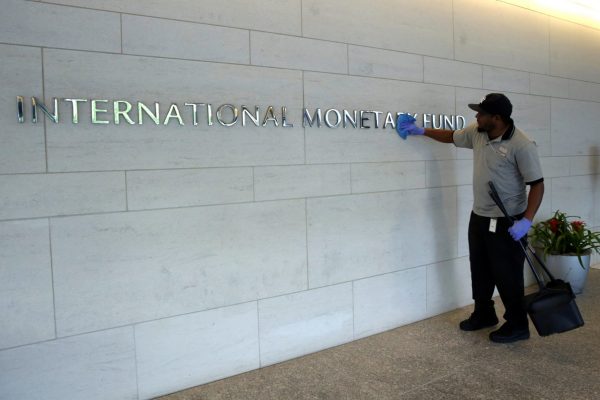These are the selection criteria for the Managing Director of the International Monetary Fund (IMF) after Christine Lagarde recently resigned her post to become the next Governor of the European Central Bank. You have until September to get your resume in. But there is a catch. There is one more criterion which was omitted from the selection criteria which you best keep in mind: non-Europeans need not apply.
When it comes to the Sisters of 19th Street, there is an unwritten rule that the US government appoints the head of the World Bank while European governments appoint the head of the IMF. Despite repeated promises from G20 leaders to end it, this horribly outdated and undemocratic tradition appears to be alive and well. The Trump administration had its candidate, David Malpass, successfully appointed as President of the World Bank in April and European governments are already busily preparing their shortlists for the top job at the IMF.
This would not be a problem, had the world not changed dramatically since the 1944 conference in Bretton Woods. In the last 40 years alone, the global share of GDP held by Asian economies has risen four-fold from 8 per cent to 34 per cent while the share held by the European Union has halved from 30 per cent to 16 per cent in purchasing power parity terms. The demise of European relevance looks set to speed up in the coming months, particularly if the new occupant of 10 Downing Street in London has his way.
Despite this growth in its economic importance, Asia’s voting power in the IMF has remained stubbornly low. If IMF voting power was aligned with global GDP, China’s voting power would triple and the EU’s would halve. This mismatch is a problem because the IMF desperately needs two things: more money and more legitimacy. Both are in short supply, and the resolution of both is in Asia’s power.
Analysis shows that the IMF’s resources are woefully inadequate to deal with anything more than an Argentina-type crisis. Thus, during the European debt crisis, it was forced into the position of being a minority lender for the first time in its history. As the IMF and the Bundesbank (Germany’s central bank) bickered over the terms of the bailout program, the people of Greece (and the reputation of the IMF) suffered. If the IMF’s quota formula was updated to better reflect the global economic reality, Asian economies would contribute more resources to IMF coffers.
Alas progress on quota reform has been slow, to say the least. Australia has surrendered quota to Asia but the big players are yet to deliver. Asia’s gain would be Europe’s loss: a prospect not welcomed by many European governments. This means the IMF is increasingly reliant on temporary funding — a large part of which comes from Asia — and has a continued legitimacy deficit. It is anyone’s guess how long this will last. But at some point, emerging Asian economies will become less willing to continue bankrolling the IMF through bilateral loans without any increased say in how those funds are used. This means a weaker IMF and, as a result, a more dangerous world.
The search for the next IMF managing director could act as a circuit breaker. Having an Asian official heading the IMF would help address the institution’s legitimacy deficit. It would also make it more palatable for Asian economies to continue their bilateral loans to the IMF and, most importantly, would buy more time for substantive IMF reform. There is no shortage of top Asian candidates either, with Raghuram Rajan (of India) and Tharman Shanmugaratnam (of Singapore) often at the top of people’s minds. Indonesian Finance Minister Sri Mulyani is an obvious choice were she not so crucial to Indonesia.
So what are the chances that the next IMF managing director will come from Asia?
Not high, according to this week’s lead essay by Shinji Takagi.
Takagi notes that some IMF traditions have been successfully broken. Christine Lagarde’s rise to power broke through a stubbornly resilient glass ceiling, successfully traversing the old boy network to become the first female managing director. The tradition of a European heading-up the IMF, however, may be harder to break.
The combined voting share of the United States, Japan, China, the eurozone and a few other EU member countries exceeds 50 per cent by a comfortable margin, notes Takagi. Based on short-term national interests alone, he warns that none of those countries holding a majority of the voting shares have a strong incentive to change the system. This risks the relevance and legitimacy of the IMF.
For a cause bigger than themselves, Takagi argues that European leaders should unilaterally and unconditionally give up their historical claim on the managing director role. They should honour the agreement they made in 2007 among themselves, and multiple times in the G20, that their then consensus candidate (Lagarde) would be the last to be selected under the existing system. ‘It is time for Europe to reset its relationship with the IMF and redeem its moral turpitude by surrendering the privilege it has abused’, Takagi says.
At this stage, while the name of the next IMF managing director remains unclear, Takagi says that one thing is for sure — the person best positioned to lead the IMF into the new decade is not a European.
The EAF Editorial Board is located in the Crawford School of Public Policy, College of Asia and the Pacific, The Australian National University.

